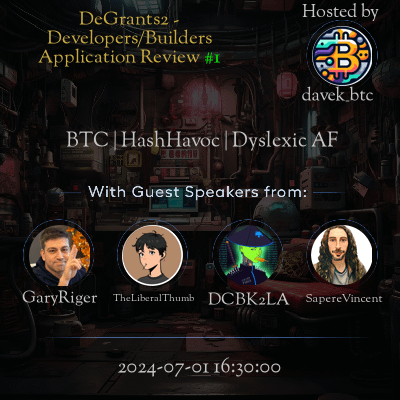This space is hosted by davek_btc
Space Summary
The Twitter Space delves into the importance of standardization for seamless wallet interoperability, highlighting challenges, solutions, and the fight against fraud in DeFi. The focus is on integrating various wallet providers to establish a unified standard and ensure widespread acceptance. Security measures, rapid testing, community feedback, and collaboration are central to creating a user-friendly, secure wallet ecosystem. Early project stages involve planning, skill acquisition, and continuous learning to adapt quickly to technological advancements.
Questions
Q: How important is standardization in wallet development?
A: Standardization ensures interoperability and seamless transactions between wallets.
Q: What challenges exist in managing crypto wallets?
A: Significant challenges include security vulnerabilities and fraud prevention.
Q: What role does the community play in the project?
A: The community is crucial for refining standards and ensuring project success.
Q: How are security risks addressed in the project?
A: Security risks are mitigated through cryptographic principles and continuous improvements.
Q: What motivates the project’s development?
A: The project aims to protect investors and create a secure, standardized environment.
Q: How are new features planned to be launched?
A: New features are launched through rapid iteration, testing, and feedback-driven improvements.
Q: Is the project in the development phase or still in planning?
A: The project is in the early stages, focusing on architectural planning and learning.
Q: What are the main goals of the project?
A: The main goals include creating an interoperable, user-friendly, and secure wallet ecosystem.
Q: Are there specific collaborations being pursued?
A: Yes, collaborations with key wallet providers and stakeholders are ongoing.
Q: How does the project balance security and usability?
A: The project focuses on robust security measures without compromising usability.
Q: Why is standardization important for cryptocurrency wallets?
A: Standardization ensures interoperability and a seamless user experience across different wallets.
Q: What are the latest developments planned for wallet features?
A: New features are timed with blockchain upgrades to stay relevant.
Q: How do developers handle quick iterations and updates?
A: Developers iterate fast based on feedback and performance for refinement.
Q: Why are open specifications significant?
A: Open specifications enable uniform feature implementation across platforms.
Q: What role do other wallet providers play?
A: Collaborations aid in standard alignment and mutual enhancement.
Q: What is the impact of fraudulent projects on liquidity?
A: Fraudulent projects can drain liquidity, affecting genuine ventures.
Q: How are investor funds safeguarded?
A: Efforts are made to minimize risks and protect investor funds from fraud.
Q: How are developers transitioning to Web3?
A: Developers learn blockchain-specific skills and trading for the transition.
Q: Why is trading knowledge important for wallet developers?
A: Trading knowledge aids in understanding market dynamics for user-centric products.
Q: What is the vision for the wallet ecosystem?
A: The vision is to create a secure, interoperable ecosystem enhancing user trust.
Q: Why is cooperation crucial among developers and providers?
A: Cooperation drives standardization and collective growth for sustainable innovation.
Highlights
Time: 00:04:12
Wallet Standardization Importance
Time: 00:10:23
Upcoming Features Alignment
Time: 00:17:45
Quick Iteration Strategy
Time: 00:28:34
Significance of Open Specifications
Time: 00:35:12
Collaboration with Providers
Time: 00:43:22
Financial Liquidity Concerns
Time: 00:50:11
Protecting Investor Funds
Time: 01:02:50
Transition to Web3 Challenges
Time: 01:12:34
Trading Knowledge Importance
Time: 01:17:37
The Importance of Wallet Standardization
Time: 01:17:53
Integration with Other Wallet Providers
Time: 01:18:28
Swift Iteration for Improvement
Time: 01:18:45
Open Specification for Any Wallet
Time: 01:30:26
Combating Fraudulent Activities
Time: 01:30:52
Project’s Early Development Stage
Time: 01:31:13
Learning and Applying New Skills
Time: 01:31:33
Balancing Security and Usability
Time: 01:31:45
Collaboration with Software Engineers
Time: 01:31:59
Encouraging Community Engagement
Key Takeaways
- Standardization is key for wallet interoperability.
- New features align with blockchain upgrades.
- Fast iterations and refinement are essential.
- Open specifications promote compatibility among wallets.
- Collaboration among providers is crucial for standardization.
- Fraudulent projects impact liquidity and require protective measures.
- Efforts to safeguard investor funds are prioritized.
- Transition to Web3 involves learning blockchain-specific skills.
- Trading knowledge is vital for effective wallet development.
- Long-term vision aims for a secure and user-centric ecosystem.
- Cooperation among developers drives innovation and standards.
Behind the Mic
ake things standard so that everybody’s eventually using the same standard. And you can flow between wallets as. As you deem necessary or whatever your particular interests are. So does this application require you to almost like, have to work with other wallet providers like extras and letter in order to make sure everybody sort of agreed to that? It doesn’t have to, but we actually were going on to leather’s space Wednesday, I believe. But we’re, like I said, we’re working also with Rider, who’s interested in payment specifications. And, yeah, what we don’t want to do is get stuck into like a six month sip request cycle at first. We want to get this out there so that it’s available when SBTC hits. We want to kind of try and fail fast if we have to, and iterate. And like I said, eventually after that, when we find out and the specs all open, anybody can implement it with any wallet at any time. Once we figure out where the kinks are and we’ve worked those things out, we want to definitely establish this as a sip and work with all the key parties. Yeah. So basically you are proposing yourself as a guinea pig and you front run everybody. So when you stream that, I get the luxury of live updates and having early developers just test the API and throw things at us. Yes. Does this involve something similar? Because it feels like we’re talking about similar types of technological. What should I say spirit? Yeah, very similar vibes. We’ve talked to developer groups discussing that on their end. They’re looking to find payments and I’ve reached out to them within a lot of the ecosystem and we just want to make it work without even talking. But I think it makes a lot more sense if we’re able to go to some of the other ecosystem players and start getting their support for something like this. Yeah, I think maybe a stepping stone to get there. Asking for fun directly was I said to good kitty, perhaps, you know, even, you know, they don’t need to spend. All they do is to stake their STX and offer to, you know, transfer that bitcoin payment to the people who deserve or people who select or the contributors. So I think that could be one way to. Nobody needs to spend anything, but they’re able to have this almost risk free of way of contributing. And that award to them is probably nothing. But to us it’s probably a lot. And this can really help to light a little bit of fire in the stacks ecosystem. So that’s the way I was thinking about it, and perhaps we can. And Stacks foundation has done that before, where they stack state amount of STX and the reward went to stacks advocates who contributed. But I think that the difference here is the way it’s being handed out, the way it’s being organized and the way it’s being highlighted will be very different. But that’s one way I could think of to make that conversation a little bit easier and as a stepping stone to get there, probably the eventual way of doing things. But for now, having a bit of SCX being staked and just bitcoin payment could be a great way to get off the ground, to get the program almost like topped up. Because we have our own little pot here, we can decide. But top up. Yeah, like there should be other ideas floating around. I mean, you know, Anna, I’ve been banging on for a while as well about having sort of trying to figure out how we can build up our own funding. You know, obviously, like Hiro said, there’s, we’ve got, there’s a lot of implications we have to consider. But I also love the idea of trying to become you know, with a little bit of our funding independence, you know? Cool. anyways, just a little bit mindful of the time. Thanks, everybody, for spending time here. Tiffany, all our talented speakers who are here on the panel, I’ll let you go. Take care. And if anybody is not following our NFTG Twitter, please do so so you’re notified when we put out the final announcement. And in the future, we’re going to use the same GPC meeting link here, so we don’t have to worry about. Can you hear me? Check. Mike, check one. Those are the best ones. Can you hear me? So let’s go, Diego. Sorry, Mr.Gox came back. I’m sorry about that. All right. OK, crazy day. But yes, I can take you, see if you’re still around. We’re just wrapping this up here, but really quick, I just want to say I’ve been really impressed with the extensive experience that the entire team has. I was really happy about that experience because, you know, we’re building from scratch and honestly never done anything like that before. So really great that we got everything done well on a good timeline. And yeah, it’s good to know that we’ve got a good structure on hand and of course everybody else’s support with data points they collected together. But I have a question regarding like your goals and objectives, how do you essentially plan on bringing in a big contributor who’s working on a big project? How do you vet them from other not so good people or listen into spaces like different data point collection, I guess. And, you know, I think you already did about like, you can just like conversationally and that person can explain his own skill, his experience or is it through some kind of form? So I think like different points of capturing that data. And then. With developers, keep in mind that, you know, if I talk to a developer, I’ll ask me, take me to your GitHub, don’t talk to me, show me what you’ve done. And so, you know, with a, an AI can do some of those tasks a lot faster and more detailed. Not all of it. Yeah. And if there’s like a public data of who everything. Who everybody can hear me. I wonder if there’s a public data where who everybody is. Maybe that’s zero authority. I mean, if you input the right information into zero authority, then, you know, that should be a good. It’s almost like a layer on top of zero authority. Zero authorities information and the data. But then you can leverage that to connect with people. Zero authority plus Twitter spaces plus. I don’t know where other data points come from, but. So just to give you an idea, like, I’ve talked to zero authority and introduced that, and he’s looking to introduce that methodology into zero authority as well. And so, yeah, we’ve already started working with people like Zero and good Kitty and Philip, you know, and GSPC. I also want to stop talking. I think I see some hands. Yep, hands up. Is hero talking. I don’t hear anybody other than you, blog face. Well, I put some illustrations below of how we manage projects, some testimonials, video from Cindy, all that good stuff. An honor, everyone. Apologize for taking up so much of your time. I think you raised Rogan. Did he just get fed up with us? I think he got fed up. He got a phone call. Dave, are you there? Or get Kitty. Are you the host now they’ve all gone. Whoever’s on the top row, he’s their name. Hero. Go. All right, here we go. Hello, and welcome to the Solana accelerator. That’s right. Sorry. Stacks stacks.







